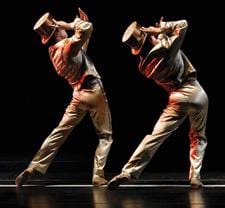Having seen A Chorus Line at least 40 times as an usher at the Royal Alexandra Theatre in the mid-’70s, it is hard for this constant critic to remain calm — or objective. When the character of Cassie sang out, loud and clear, “God I’m a dancer, a dancer dances!” we barely post-Stonewall gay usherettes would chuckle among ourselves in the lobby and quietly sing, “God I’m an usher, ah usher ushes!” All Broadway wannabes of various designs, we made our way to the theatre six nights a week, with two matinees, when minimum wage was minimal and it was a pleasure to see a great big musical over and over and over again. As great big musicals come and go, the one singular sensation, billed as “The Best Musical. Ever,” won the Pulitzer Prize for drama in 1976 and became the longest running musical of its time. A Chorus Line ranks among the truly great pieces of innovative 20th-century theatre that has yet to be surpassed for its sheer simplicity and strength of emotion.
The current touring production, following the 2006 New York revival, is tainted by a hit-and-miss ensemble that frequently excels but never quite packs the overall punch this hard-hitting show truly needs. Nevertheless, the production still manages to be a breakneck, solid piece of musical theatre that holds its own among contemporary Broadway fare that tends to rely upon linear Disney-esque stories or nostalgic spoofs of our favourite television and cinema memories. So if you’re feeling a little overwhelmed by the formulaic sketchy comedy of Spamalot or the overproduced, hyper sci-fi treatment of We Will Rock You, then this is the show for you — a show committed to sharp characterization, stark, cacophonous music, beautiful melodies and classic modern choreography.
Marvin Hamlisch’s score depends upon a gradual build from the tinny rehearsal hall piano to the pumped up, full orchestral sounds of the final numbers. Unfortunately the touring cast is populated by voices that are at times shrill and unsettling when they should be melodic and powerful. The slight Brechtian, breaking-the-fourth-wall tendencies of the show demand a tightly woven ensemble that can achieve both brassy mediocrity and classic excellence in their respective roles as they engage in full frontal monologues and disconnected dialogue interspersed throughout that conspire to create a sense of the unconscious spirit of a group of struggling artists. The current production achieves much of this, but suffers from weak choreographic execution and melodic strength in some of the pivotal numbers such as “At the Ballet” and “The Music and the Mirror.”
Highlights include Gabrielle Ruiz as Diana, Anthony Wayne as Richie, Natalie Elise Hall’s “Tits and Ass”-waving Val and the ever popular gay character of Paul, beautifully and poignantly played by Bryan Knowlton. Paul’s very moving speech, describing some of the seedy drag club’s of Manhattan as “the asshole of show business,” is still, more than 30 years later, an extremely moving coming out story.
Despite some glaring weaknesses in the touring production, A Chorus Line still manages to move at an incredible pace, without a single song that disappoints, contributing to an overall narrative that thrills and entertains with each new tuneful story from a cast of 26 talented dancers and singers.
And the bodies are heavenly!

 Why you can trust Xtra
Why you can trust Xtra


